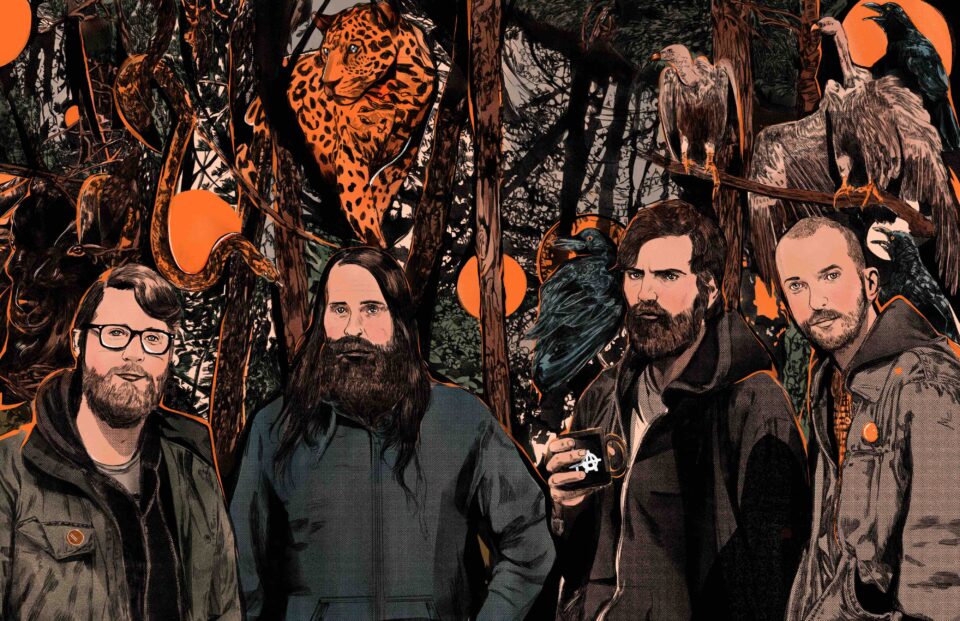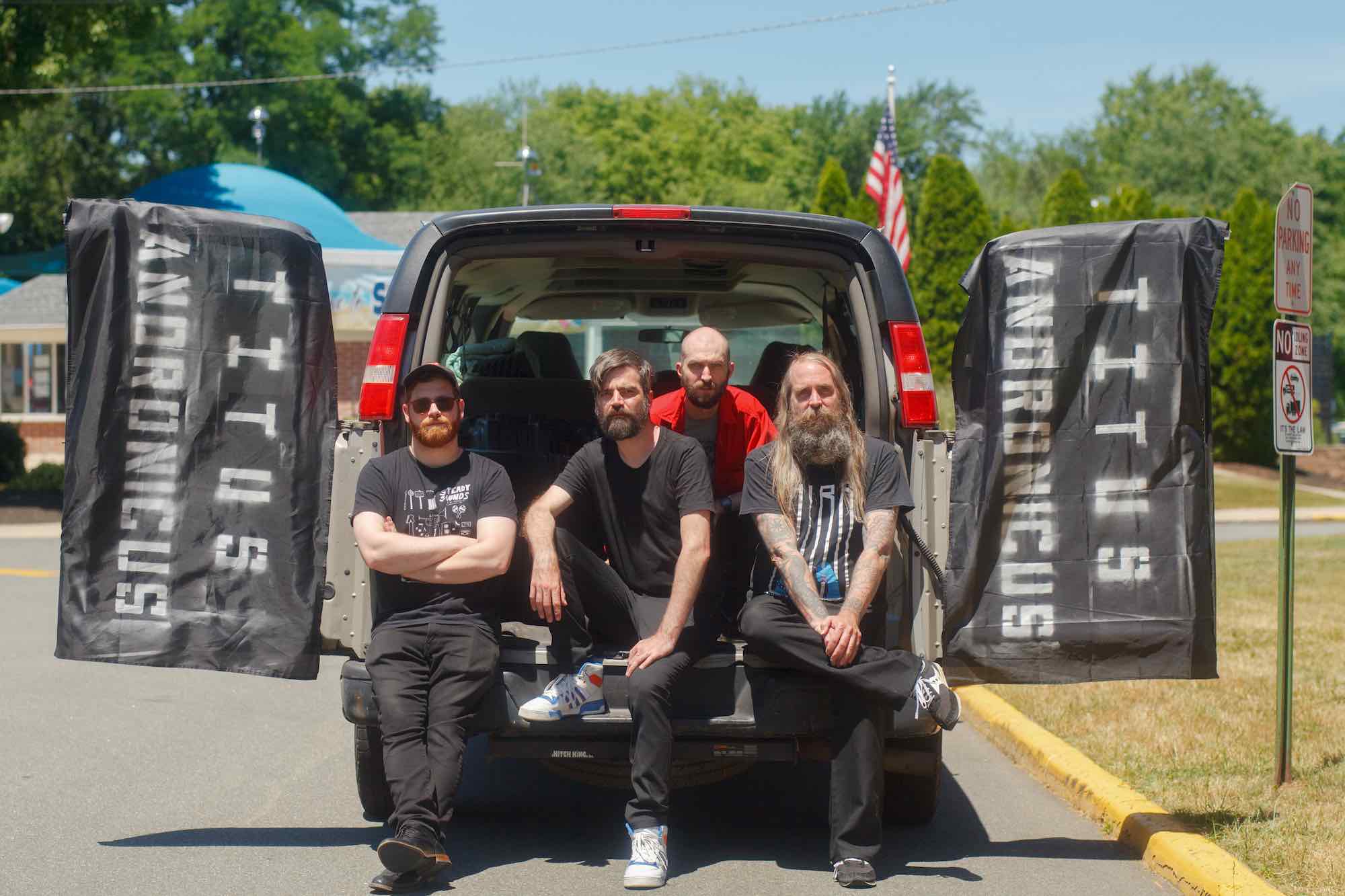The music of Titus Andronicus often feels like it’s in dialogue with itself. The yin-and-yang releases A Productive Cough and An Obelisk from 2018 and 2019, respectively, split the band’s raucous punk rock and folk storytelling into two distinct but complementary entities. Three of their albums are connected by sequential but separate entries in a series of songs titled “No Future.” And on 2015’s The Most Lamentable Tragedy, a triple-album about manic depression, the band’s founder and songwriter Patrick Stickles reincorporated titles, melodic elements, and motifs from previous records into its epic arc, as well as featuring two different songs titled “I Lost My Mind.”
Which makes it all the more apt that Titus Andronicus should release The Will to Live after touring The Monitor for its 10th (technically 11th) anniversary, pivoting off that album’s one-man-against-the-world (or Boston, anyway) narrative with a more mature and introspective—but nonetheless epic—saga. Co-produced by Stickles and Howard Bilerman, The Will to Live is Titus Andronicus firing on all cylinders and delivering meaty rock riffs in generous quantities. A literal trip to Hell and back, it’s an intricate, witty, and over-the-top rock opera that only Stickles could have written, all in the service of chasing an ideal that he refers to as “Ultimate Rock.”
Yet there’s a hard-earned wisdom to these songs as well, inspired by a genuine experience of loss that Stickles went through over the past year after the death of Matt “Money” Miller, Stickles’ cousin and Titus Andronicus’ founding keyboardist. Then again, this is still Titus Andronicus, and even in the face of tragedy, the group finds something life-affirming and inspiring in the therapy of rock ’n’ roll.
We spoke with the gregarious frontman about finding hope in a period of grief, the growth he’s undergone since releasing their landmark album The Monitor, and the pursuit of “Ultimate Rock.”
Before making The Will to Live, you revisited The Monitor for its 10th anniversary. But that was on its 11th anniversary—by necessity I suppose?
We live in an age now where people aren’t so strict about what number you need to have to have an anniversary tour. It would have been the 10-year anniversary tour but—well, you know what happened. That’s not the worst part of the whole thing, but it was fairly inconvenient.
There’s a similar narrative arc between the two albums that feels like a deliberate parallel. Was the connection intentional?
Our plan was to go into the studio right after we finished the [Monitor] tour. The concept was that the tour would be a convenient time for us to rehearse a lot. When you’re not on the road, the band doesn’t typically play together every day for 20 days in a row. So the tour was a good way to dust off all the cobwebs, especially after almost two years of playing together very little. And while we weren’t doing the material from the new album at those shows—because it was a nostalgic, legacy-artist kind of show—it got the ensemble back to being the well-oiled machine that we like it to be.
“I’ve been trying to take these challenges and try to be a more compassionate person in having gone through them, a person of greater gratitude who can appreciate the fragile nature of life.”
Obviously we hadn’t forgotten all about the new songs by the time we got back to the studio, but it was less a case of the particular qualities or aesthetic attributes of those Monitor songs informing the new album and more the energy that we had received from the audiences of that tour and the reception they gave us and just trying to produce something that ideally could provoke a similar ecstatic response when we eventually take these songs out on the road, perhaps on their own 10th anniversary tour. Someday…2032, I suppose. God forbid.

This album also arrives after you’d gone through a period of grief and loss. Yet there’s something triumphant about these songs as well—was there something hopeful you wanted to convey?
I think most of us would hope that, when difficult and challenging things in life happen, as inevitably they will, you come out the other side of it with a deeper perspective and understanding of life. I don’t want to say there’s always a silver lining or anything, because I don’t know that it applies here, but bad things are always going to happen, there's always going to be loss and sorrow. But you hope to avoid the fate of having these bad things happen to you, and in the aftermath you’re more of a jaded, cynical, hard-hearted misanthropic person, right? You can’t control when these things happen a lot of the time, but you can, to a certain degree, control what you take away from them. I’ve been trying to take these challenges and difficulties and sorrows and try to be a kinder and more compassionate person in having gone through them, a person of greater gratitude who can appreciate the fragile nature of life.
“It’s a very deliberate, intentional thing to say, ‘We’re going to do the biggest and best and hardest hitting version of our music. It’s going to take a lot of diligent hard work, but that’s what we’re going to do, dammit.’”
That’s the personal journey I’ve been on these past few years, so when it comes to writing the album, why don’t I construct a narrator who will be the protagonist of my little story? And I’ll send him on a similar journey to the one I’ve had. The narrator goes through these experiences that make him frustrated or frightened or despondent and hopeless, and the narrator, having gone through this journey, ultimately realizes what I just said, that life is fragile and precious and there’s an interconnectivity to all living things on Earth that demand respect and have their own amount of dignity, but we should treat other people with as much kindness and dignity and compassion as we can muster.
What’s your ideal of “Ultimate Rock”?
It’s exactly that, it’s only an ideal. Few have achieved it, though many have tried, and some have found really great results in that pursuit. It’s a vision of rock music that could not possibly be any bigger or any denser or even one bit larger than life. It’s completely full to the brim of overpowering energy that just wallops the listener, and they just can’t help but be overwhelmed and have a blast while they’re listening to it. So that, to me, is records like Hysteria by Def Leppard, Meat Loaf’s Bat Out of Hell, the first Boston album, [The Who’s] Who’s Next, AC/DC’s Back in Black, Metallica’s Black Album—albums that bands make that are like, “We want to make the ultimate version of the thing that we do, we want to pursue it to its logical conclusion.”
And many times it’s illogical or goes too far, like with Guns n’ Roses’ Use Your Illusion I and II, which are records that I dearly love. But Metallica doesn’t make an album like the Black Album by accident. They didn’t just say, “Oh, we got a few songs, we’ll just go into the studio and bang ’em out.” It’s a very deliberate, intentional thing to say, “We’re going to do the biggest and best and hardest hitting version of our music. It’s going to take a lot of diligent hard work, but that’s what we’re going to do, dammit.”
“In the past I’ve had a tendency to look at my younger self as a moron, like a naive child. So to present [The Monitor] on stage I had to forgive my younger self for how wayward and misguided he often was.”
Do you feel that you’ve grown quite a bit from the version of yourself that wrote The Monitor?
Shoot, I wasn’t even 25 years old at that point. I’m 37 now, so I would hope so—that’s a long time! I’ve undergone a complete cellular regeneration and a half. I’m literally a different person in that way. I’m married now, I’ve really settled down a lot, both in terms of my marriage but also taking care of myself and looking after my mental health. It’s a very long road to walk to get to the point where I’m at now.
That did make it a challenge to do that Monitor tour, to try to inhabit the mindspace of my younger self, because I wrote those songs so many years ago, and in the past I’ve had a tendency to look at my younger self as a moron, like a naive child. So then to present that album on stage I had to kind of forgive my younger self for how wayward and misguided he often was and say, “This second record I made, The Monitor, it’s not so bad. Here’s a guy with the stars in his eyes, out there taking a big swing, and I gotta hand it to him.” FL









